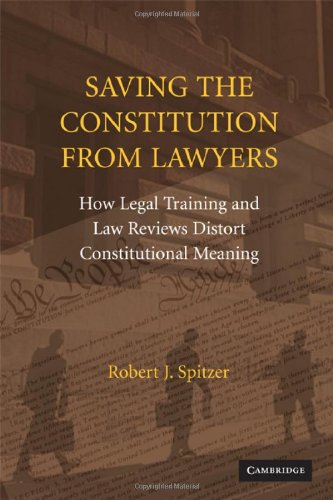

Most ebook files are in PDF format, so you can easily read them using various software such as Foxit Reader or directly on the Google Chrome browser.
Some ebook files are released by publishers in other formats such as .awz, .mobi, .epub, .fb2, etc. You may need to install specific software to read these formats on mobile/PC, such as Calibre.
Please read the tutorial at this link. https://ebooknice.com/page/post?id=faq
We offer FREE conversion to the popular formats you request; however, this may take some time. Therefore, right after payment, please email us, and we will try to provide the service as quickly as possible.
For some exceptional file formats or broken links (if any), please refrain from opening any disputes. Instead, email us first, and we will try to assist within a maximum of 6 hours.
EbookNice Team

Status:
Available0.0
0 reviews
ISBN 10: 0521896967
ISBN 13: 9780521896962
Author: Robert J Spitzer
This book is a sweeping indictment of the legal profession in the realm of constitutional interpretation. The adversarial, advocacy-based American legal system is well suited to American justice, in which one-sided arguments collide to produce a just outcome. But when applied to constitutional theorizing, the result is selective analysis, overheated rhetoric, distorted facts, and overstated conclusions. Such wayward theorizing finds its way into print in the nation's over 600 law journals – professional publications run by law students, not faculty or other professionals – and peer review is almost never used to evaluate worthiness. The consequences of this system are examined through three timely cases: the presidential veto, the 'unitary theory' of the president's commander-in-chief power, and the Second Amendment's 'right to bear arms'. In each case, law reviews were the breeding ground for defective theories that won false legitimacy and political currency. This book concludes with recommendations for reform.
1 The Logic, and Illogic, of Law
Lawyers as Liars?
Thinking Like a Lawyer
The Adversary System, Advocacy, and Truth
Lawyering versus Scholarship
Social Sciences and the Rules of Inquiry
Conclusion
2 The Law Journal Breeding Ground
History
Students in Charge?
A Scholarly Enterprise?
How the System Works
Criticisms
Professional Peer Review: The Academic Gold Standard
The Problems with Student Control
Length, Redundancy, and Footnotes
Conclusion
3 The Inherent Item Veto
Colonial Precedents
Defining the Veto
What is Law?
Impoundment
What the Founders Understood about the Veto
State Precedent?
The “Rider” Problem
The Bill Definition and “Omnibus” Problems
The Presentment Clause
The Veto as a “Revisionary” Power
An Eviscerated Veto?
Conclusion: Rescuing Constitutional Interpretation
4 The Unitary Executive and the Commander-in-Chief Power
The Unitary Executive Theory: Article II on Steroids
The Constitutional Commander-in-Chief
The Commander-in-Chief According to Yoo
From Law Journal to Law
The Bush Commander-in-Chief
Distorting the Courts
What Hamilton Says
Other Cases
A Political Document or a Legal One?
Conclusion: Reinventing the Commander-in-Chief
5 The Second Amendment
The Meaning of the Second Amendment
Supreme Court Rulings
Other Court Rulings
The “Individualist” Critique
The “Right of Revolution”
Collateral Claims and the Research Record
Seeking Shelter under the Fourteenth Amendment
Public Policy Consequences
Interest-Group Involvement
Conclusion
6 Conclusion
Reform
Legal Training and Research
Law Reviews
Law Reviews Will Still Matter
saving the constitution
the constitution book pdf
a lawyer looks at the constitution
u.s. constitution book pdf
u.s. constitution audiobook
Tags: Robert J Spitzer, Constitution, Lawyers